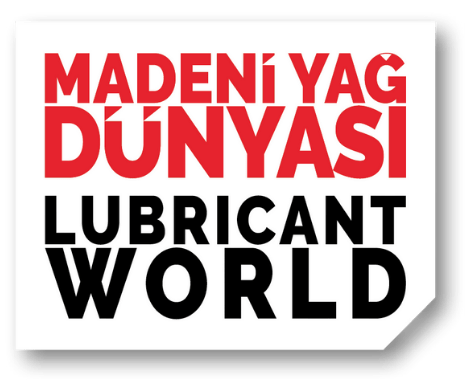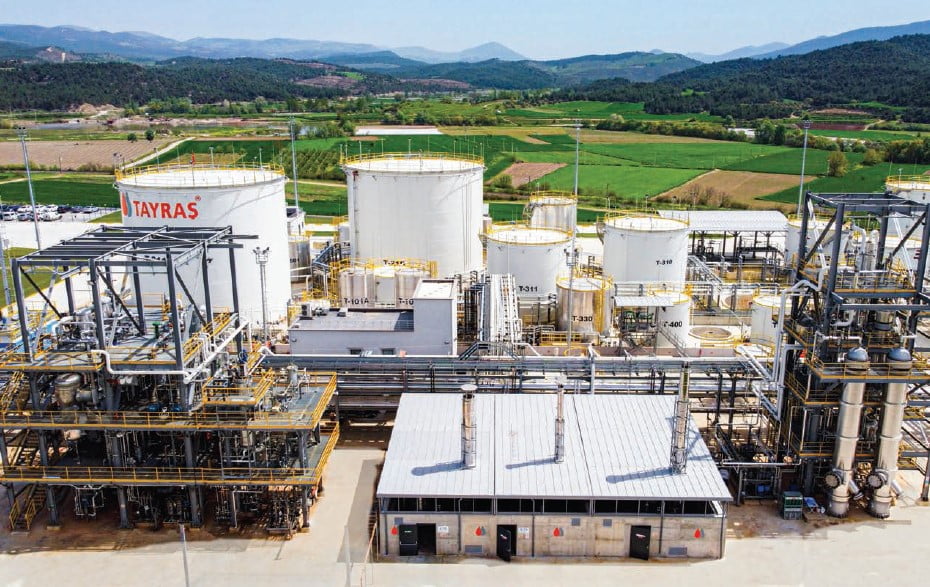TAYRAŞ Used Lube Oil Refinery, Turkey’s first Group II+ base oil refinery and the technology leader in this field, offers second useful life for used lubricating oils. In addition to its environmental benefits, it also comes to the fore in security of supply with the recent fluctuations in base oil supply. We had a nice conversation with Aydın Özbey, General Manager of TAYRAŞ, and asked him about everything on upcycling and the obligation that comes with the legislation in Turkey.
Mr. Aydın, could you please tell us about yourself?
I have been the General Manager of TAYRAŞ for about 7 years. I graduated from Petroleum and Natural Gas Engineering Program at the Middle East Technical University in 1999. I worked on hydrocarbons in my entire career and most recently, I am working on waste oils, which are their waste. I had the opportunity to work in the leading companies of our country in the field of crude oil, fuel, LPG, especially in operational terms. I acted as a coordinator for lubricants and waste oils at the Petroleum Industry Association for about 8 years. After that, I took office at TAYRAŞ.
Could you give us information about the TAYRAŞ Refinery, Turkey’s first and only upcycling facility? We would like to know how it was established, what your production and employment capacity is, and what you offer to the market.
TAYRAŞ was established in 2011 with the aim of making an industrial scale integrated environmental investment in Turkey on used oil refining, which has been a successfully applied method in the world for many years.
I owe a debt of gratitude to all our shareholders, especially Mehmet Afşin, our Chairman of the Board, who made this dream come true. I would like to thank the public, sectoral non-governmental organizations such as the Petroleum Industry Association, MAPESAD, and the valuable people of the fuel, lubricant and waste recycling sector, who believed in our dream and always supported us.
As covered in the EU targets and Turkish legislation, waste is an important raw material. It is the raw material for the green transformation and the circular economy. At TAYRAŞ, we produce base oils by adding value to used lubricating oils with the most advanced refinery technology available, one step ahead of recycling.
TAYRAŞ has an annual refining capacity to process 60 thousand tons of lubricants that have completed their useful life. With the Group II+ Base Oils we produce, we aim to contribute 30 million dollars per year to the current account deficit. Currently we create employment for 250 people.
We completed the construction of our refinery in early 2021 and produced Tukey’s first Group II+ base oil as clear as water. As the TAYRAŞ family, we are very happy to have reached this stage after more than 10 years of effort. It is a great excitement for us to have implemented such an important project for our country.
With our capacity to meet roughly ten percent of Turkey’s base oil demand and with our sustainable, resource efficient production cycle in which we follow Zero Waste procedures and implement the best energy, water and waste management, we put on market low carbon and low water footprint, high value-added base oils under the TIDRABASE brand. We aim to be a pioneer and a good example with our technology and application leadership.
For the first time in our country, Group II+ Base Oils, which will be produced from waste, will be supplied as a strategic raw material for use in three areas of application, including the lubricants industry, the defense industry and the automotive industry, where high performance is much needed.
While carrying out this production, we use environment and climate friendly technologies and follow zero waste principle, and we continue our Zero Waste Certification process with this aim.

What is upcycling? Can you please tell us about the hydrotreatment process?
As an introduction to this question, I would like to give some information about the form of the lubricant at the end of its useful life. When lubricants and especially engine oils reach the end of their useful life, friction-induced metals and combustion-induced pollutants may accumulate within the oil while it functions under high pressure and temperature conditions. Besides, some additives are depleted.
At the TAYRAŞ Upcycling Refinery, the waste oil undergoes a distillation process in which all pollutants in the waste oil are removed by physical and chemical reactions. As a result, we get the original base oil in its content.
There are many technologies licensed for all these processes around the world. What distinguishes hydrotreatment technology from other methods and makes it the most advanced technology in the world is the removal of sulfur compounds in the light and heavy distillates from distillation processes, the saturation of unsaturated hydrocarbons, and raising them to a level called Group II as per API Base Oil classification.
Our upcycling motto here is to bring the lubricant, which has reached the end of its useful life, back to its original form and make it available as a raw material to our lubricant manufacturers for the same purpose.
Using waste oils to produce base oils with Group II+ quality is very valuable for both the national economy and our environment. What are the technicalities of obtaining this product?
First, let me give some information about the method in order to better explain the details in the process of obtaining this product. The lubricants in the waste oil storage tanks at the facility are first neutralized by caustic processing. It is then subjected to a dewatering and then a three-stage distillation process, a total of four stages. All processes here are carried out under vacuum conditions.
The subsequent hydrotreatment process is the most important stage. We produce the hydrogen we need in a separate unit in our facility by steam reforming the natural gas we take from the system.
This entire process is an integrated process, just like the system operating in a crude oil refinery. On the one hand you have heating, on the other hand you have cooling; you need steam, boiling oil, vacuum, and hydrogen all at the same time. In the meantime, you have to manage the resulting gases and wastewater. This whole system has a brain. We collected everything in the control room. From start to finish, we can monitor the whole process, all these systems from the control room.
We have a laboratory with TÜRKAK 17025 Accreditation. We can perform the tests stipulated by the regulation on waste lubricants, as well as certain tests on base oil as the final product in this well-established laboratory. At the same time, we have a simulation device in our laboratory that can pre-measure the quality and quantity of the distillates, that is, intermediate products that we can obtain from waste. In other words, before we feed the waste oil into the system, we know the efficiency and quality of the base oil we can produce with the products contained in the waste oil.
Today, TAYRAŞ is the only refinery in the world that carries out the hydrotreatment process at a pressure of 125 bar. This is a very important value in terms of product quality.
What does the base oil produced by TAYRAŞ stand in the global market?
We offer base oils in three different grades in our country and in the world market: N70, N110 and N220. These are the base oils that can be used in the production of metalworking oils, process oils, hydraulic fluids, textile oils, heat transfer oils and high performance engine oils. According to the GEIR data, the demand for base oils in 2018 was around 3.7 million tons in EU countries. 17% of these are obtained from re-refined base oils. In this regard, there is an important market in the EU.
Following the decrease in the supply of crude oil refineries during the pandemic, we have seen that especially EU countries continued uninterrupted supply of base oil. Re-refining plants assumed an important role in this process and this is a source of happiness for our industry.
As TAYRAŞ, what are your future goals and plans regarding waste oils, which we can say is among the top agenda items for our industry?
To realize a continuous and uninterrupted production with Group II+ quality, to ensure that both environmental and economic benefits are known, and to be a source of inspiration for new investments to be made in this field and in the field of waste.

One of the hottest topics on the agenda of the lubricants industry is the obligation imposed by the Regulation on Waste Oil Management. According to this;
“In lubricant production, it is obligatory to use base oils produced from waste oils at 8% for 2022, 12% for 2023, 15% for 2024 and at the rates to be determined by the Ministry for the following years. Imported base oils are not included in the mandatory usage rates determined in this paragraph.”
As a facility that collects waste oils, what does TAYRAŞ think about this?
We see that this issue has also started to be discussed in the EU Commission. Since the circular economy is seen as the raw material of green transformation, there is a voluntary use of 17%, as I have just mentioned. There are of course several reasons for this. There are carbon taxes. The carbon footprint of a lubricant that you blend using a base oil made from waste oil is about twice as low as a base oil derived from crude oil. The world has set very strict targets for reducing the carbon footprint. This issue should be handled from this perspective. Even before the European Union, this was added to the legislation as an obligation in our country. In this context, we hear that the Turkish model is also being discussed in the EU.
Is there a quality and proper waste oil producer in Turkey?
There are existing investments in this field in our country. There are 3 or 4 companies that have obtained a license from our Ministry in this context. It has also been certified by TÜBİTAK that these investors produce products that can be supplied as base oils. New investments will be made over time.
We, as TAYRAŞ, produce base oils with a Group II+ quality. These companies may produce Group I base oils. Someone else may produce Group III in the future. Each product group has their own consumer group and areas of applications. Facilities certified and authorized by TÜBİTAK will determine the supply in this sense. There is an obligation, but of course blending is not possible without supply. The development of the waste oil upcycling sector will contribute to both the lubricant sector and the fuel sector. It is very important to support and encourage base oil producers.
Do you encounter with any problem in waste oil collection? Is it paid or free?
This subject is as important as establishing a refinery. We have huge drawbacks in waste logistics. To date, PETDER has established the most perfect system in terms of management. It is a wonderful structure that includes many elements such as health, safety, environment, customer relations management, raising awareness of the society, and supports this with social responsibility projects. We must accomplish that as well. There is a need for refining facilities with a waste logistics management system that will serve as a model for Turkey’s waste management. We have taken important steps in this direction. We have established a large team, prepared our infrastructure, established important collaborations. We have created transfer points in certain areas. We have established a beautiful model and we want to be a source of inspiration for our entire industry with this model.
The fee is a key issue for sure. After all, waste oil is a raw material. If you do not pay a fee, this product may be used for other purposes. We pay a fee and tell them what this product will be used for and which product will be obtained.
In Turkey, approximately 400 thousand tons of lubricants is consumed every year, and approximately 275 thousand tons of lubricants that have completed their useful life come out. A major part of this amount cannot be collected as the legislation obliges (i.e. in a registered system) and cannot be used for environmental and economic benefits and employment.
As TAYRAŞ, we wish to establish a logistics model just like in our refinery. I would especially like to point out that anyone who wants to be inspired by us, to get information from us and to understand us is always welcome.




